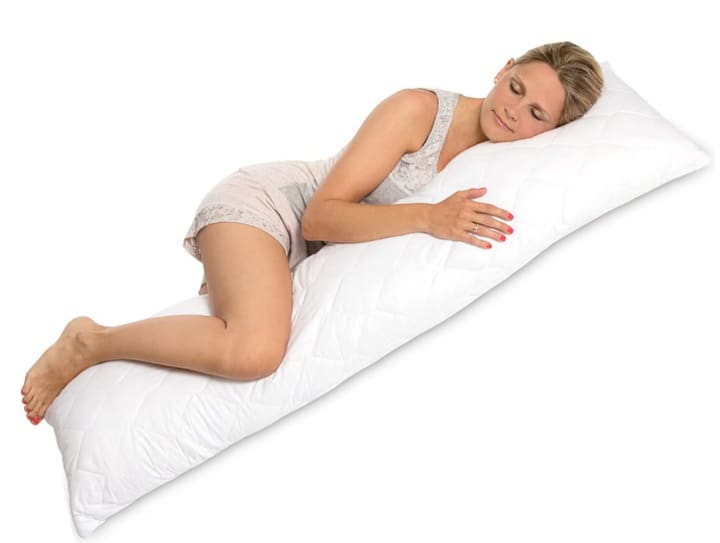Forget Morning Routines!
A Successful Day Starts with a Successful Night (16 Tips)

Imagine…
Imagine waking up in the morning, having slept only 4 hours, you'll feel terrible, tired and annoyed. You just woke up and you're already off to a rough start.
On top of that, your neck or back hurts. Seems like you slept in a bad position, have a bad pillow or caught a cold in your neck/shoulders due to air conditioning or cold air flow.
Now you got to get up with pain in your back, neck, shoulders… your day is already ruined before it even started.
Morning Routines?
Would you get out of bed at 6AM and be motivated to do morning exercises, yoga, stretching and all that stuff? All while feeling like that?
I wouldn't.
Quality Sleep is EXTREMELY Important
Apart from preventing the above problems, sleep also promotes cognition and memory, it facilitates learning, recharges our mental and physical batteries, and generally helps us make the most out of our days.
With plentiful sleep, we improve our mental and physical health, reduce stress, and maintain the routine that is critical to healthy daily functioning.
If you already sleep really well - perfect. If you don't, get out your notepad and start taking notes.
Here are 16 tips that you can use to improve your sleep. More detailed explanations you can find below.

- Tip 1: Create a clean sleeping environment
- Tip 2: Open the window
- Tip 3: Turn off the heating in your bedroom
- Tip 4: Get a good pillow
- Tip 5: Optimize your sleeping position
- Tip 6: Get a "sausage-shaped" pillow
- Tip 7: Prepare your phone and put it away
- Tip 8: Read before sleeping
- Tip 9: Journal before sleeping
- Tip 10: Plan & prepare for the next day
- Tip 11: Sleep 7–8 hours per night
- Tip 12: Don't eat late in the evening
- Tip 13: Foam roll
- Tip 14: Put a bit of lavender oil on your pillow
- Tip 15: Make it dark
- Tip 16: Use earplugs and a sleep mask
Find the explanations below.
---
Tip 1: Create a clean sleeping environment
Clean your bedroom, have only the bare essentials there (a bed). No phones, no TV, no laptop, no tablets, no gaming consoles… Remove the technology.
If you need an alarm, then at least put your phone somewhere besides on your nightstand. I put it on a bookshelf a little further way, so that it's easy to grab in the morning but it isn't right by my bed.
Tip 2: Open the window
There is nothing quite like drifting off to sleep in a cool and refreshing environment. However, this relaxing effect of fresh air isn't just in your head - some scientists believe that there may be a link between cool fresh air and relaxation that allows us to go to sleep more easily.
It also improves the quality of sleep, because the open window prevents CO2 build-up. High levels of CO2 can be damaging to your health, especially when you are breathing it in constantly through the night. It has been documented that sleeping in rooms with high levels of CO2 can lead to symptoms of headaches, nausea, and dizziness. You can only feel the full effects in the morning when you wake up.
Note that when you're living in noisy or unsafe areas, then it might be better to keep the window closed. Same goes for when you're living in the arctic and it's -20° Celsius outside. But, when you can, open the window and get that fresh air.
Tip 3: Turn off the heating in your bedroom
For all the reasons described in the previous tip, simply turn off the heating in your bedroom. A bedroom should be fresh and cool, the blankets will keep you warm.
It is also unnecessary, and it will save you money on heating, which you can then use to invest.
Tip 4: Get a good pillow
I tested 5 pillows before I finally found one that also supported my neck and kept my head and spine in a neutral position. If you pillow is too thick, and your head is inclined, you'll get a stiff neck or neck/back problems in the future (or even the next morning). Same when your pillow is too thin, so it doesn't support your head and neck enough.
Go to a sleeping store, test pillows, get a good one.
Tip 5: Optimize your sleeping position
If you prefer sleeping on your side, make sure to choose a good pillow as described in the previous tip, to avoid neck and back pain. Sleep on whichever side feels most comfortable, but don't be afraid to switch to a different position if it's not working for you.
On your back - If you prefer sleeping on your back, try putting small pillow under your knees. This may help support the natural curve of the back. Sleeping on your back uses gravity to keep your body in an even alignment over your spine, which can help reduce any unnecessary pressure on your back or joints.
On your belly - If you prefer sleeping on your belly, use a very thin or no pillow at all - again, the neck reasons, I don't think I need to repeat this.
On your side- Read the next section.
Tip 6: Get a "sausage-shaped" pillow
Basically, it's a very long pillow that's about 1 meter long. If you sleep on your side like most people do, then you should place the pillow between your legs and under your upper arm.

Why? Because this puts your hips and upper body in a neutral position. It supports your upper leg, prevents it from "hanging" down in a bad angle.
Without support, your hip joints are not in a neutral position - and while it might not hurt, it puts unnecessary stress on those joints and muscles. Your body is not in balance anymore, and sooner or later it will complain. Same thing goes for your upper shoulder. If you do nothing, it will just "hang" there, drooping down, unsupported.
On some mornings I'd have pain in my shoulder if I tried to lift my arm. This pillow fixed that. Oh, and for the singles under us: it's also a great hugging partner! ;)
Of course, there were a few times it was annoying to share my bed with a supersized cushion. Some nights, I woke to find I'd kicked it on the floor during the night, due to heat or lack of space, but mostly, I loved it, and it helped me sleep much better.
Note: Alternatively, you can just use 2 thicker pillows - place one between your legs, and the other one under your upper arm. This will also help to better align your hips and avoid low back pain.
Tip 7: Prepare your phone and put it away
We all know we shouldn't use technology before bed, but most of us still find ourselves tucked up in bed, on our phone, scrolling through social media - which is designed to be addictive and to make you keep on scrolling.
Also, the light of your phone restrains the production of melatonin, this is the hormone that controls your sleep-wake cycle. This makes it more difficult to fall asleep and wake up the next day.
So, set your alarm, pick which morning meditation you're going to listen to (if you're into this), reply to any final messages, and then put it away somewhere where you won't be tempted to look at it.
I try to have my phone put away at least 45 minutes before I go to sleep, and then I read.
Tip 8: Read before sleeping
With your phone gone, what are you going to do? Read.
Reading reduce stress, improves knowledge, increase vocabulary, improves memory, teaches you new skills, improves writing, provides entertainment, relaxation and distracts your mind from work or other stuff that happened to you during the day.
Emptying your mind and relaxing will help you falling asleep.
Tip 9: Journal before sleeping
Now is the perfect time to journal. Journaling is simply taking a notebook and writing down a review of your day. Write about the things you did, your successes, the challenges you faced, the thoughts you had. Sit down at the end of each day and analyse your day, your actions and thoughts, and think about how you could improve the next day.
I like to rapid log my day. This is a bullet journal technique where you divide you days into half hour blocks of time, and then write what you did in each of them. You can buy bullet journals online if you like. It is really helpful to see on which things you spend time each day and to evaluate it.
While you're writing anyway, plan for the day ahead. What are you looking forward to tomorrow? What do you need to get done tomorrow? Write down a to-do list.
Tip 10: Plan & prepare for the next day
Look at your calendar to see what your plans are tomorrow and prepare accordingly. You already have your to-do list, but you should do much more.
Put your clothes out, pack your work bag and prepare a healthy lunch. Prepare your things for your morning routine: Make sure your weights and yoga mat are laid out and ready. Prepare your workout clothes, a bottle of water, the newspaper…
There's nothing like going to bed knowing that everything is ready for the morning. I prepare every single thing that I can, so that when I wake up, I barely have to do anything. Closing your eyes with the knowledge that you are prepared for the day ahead will help you get to sleep easier.
On top of that, you'll be able to hold on to your routines and build new, healthy and awesome habits.
It also has the added benefit of reducing decision making in the morning, and therefore limiting your decision-making fatigue tomorrow.
Tip 11: Sleep 7–8 hours per night
The average amount of sleep you should get is around 7 hours. Most people feel tired when they sleep less or more, so always try to focus on these 7–8 hours.
Essentially the most important thing for a good night's sleep is if you feel well-rested in the morning. If you feel rested after five hours, six hours, seven, eight or nine - that's great and you should not worry. But if you sleep less than you'd like to sleep, and you feel the negative effects of it in terms of your mood and ability to function, then it's time to change this.
No matter how many hours you sleep, you should be able to wake up fresh.
Tip 12: Don't eat late in the evening
Eating late confuses your body. Your body feels it's time to sleep, but instead it needs to start working to digest the food you just gave it. Eating late can result in higher chances of depression and anxiety, an increase in blood pressure, hypertension and diabetes. Oh, and it's simply not good for weight loss.
Many people have dinner as the biggest meal of the day, but when we have such a big dinner, we simply don't get quality rest because our body is busy digesting and working overtime.
While the body actually is supposed to be resting & recharging, it's spending its energy to digest the food you just gave it.
In essence, your food pattern should be something as follows: a huge breakfast, a big lunch and a very light dinner.
Tip 13: Foam roll
Just do a quick google search in case you don't know what this is. Foam rolling has many benefits, especially when done in the evening. In only 10 minutes each night, you can drastically improve your mobility and recovery, leaving you feeling less tight and more relaxed.
Foam rolling also helps you to connect with your body before sleep and stimulates your nervous system. You could say it's a form of moving meditation.

Tip 14: Put a bit of lavender oil on your pillow
Smells are also an incredibly powerful trick to include in your sleeping routine. I like lavender, which is the traditional sleep smell.
It helps to promote calm and relaxation and helps with sleep. But you can use any smell. The point is to associate this smell with relaxation and sleep.
As soon as I smell the lavender, I feel safe and relaxed. It's become a comfort for me, because it is associated with being tucked up in my comfy bed, feeling relaxed and prepared for the next day.
Tip 15: Make it dark
Make your room dark. Invest in good window blinds. Sleeping in a dark room can greatly improve your quality of sleep. Darkness causes the brain to produce the hormone melatonin, which gives us that sleepy feeling.
Melatonin is the body's natural sleep aid, which is only produced once all artificial and natural light is gone and the room is as dark as possible.
Tip 16: Use earplugs and a sleep mask
Research has shown that the use of earplugs and eye masks not only improves sleep quality, but also increases the amount of REM sleep and melatonin levels.
Sleep masks block out light, and together with earplugs they help minimize distractions at night and make sure you have a better-quality sleep.
Note that you shouldn't use this every day. If your room is dark enough, it's not necessary to put on the extra sleep mask.
KEY TAKEAWAYS
Having a good night sleep is essential for being successful during the day.
While morning routines often act as a powering up sequence, evening routines can be a useful tool to signal that it is time to relax and sleep, and these practices can lead to improved quality of sleep.
Play around with different evening practices and see what works for you. Some will resonate more for you, and you'll probably find your own.
-
As always, thank you for reading and I wish you a good night :)
Make sure to check out my other stories about habits, investing, passive income and other tips to improve your health, wealth and life.
About the Creator
Michiel Schuer
Enthusiastic about learning new things, side-hustles, and translating my personal experiences into motivational stories.






Comments
There are no comments for this story
Be the first to respond and start the conversation.